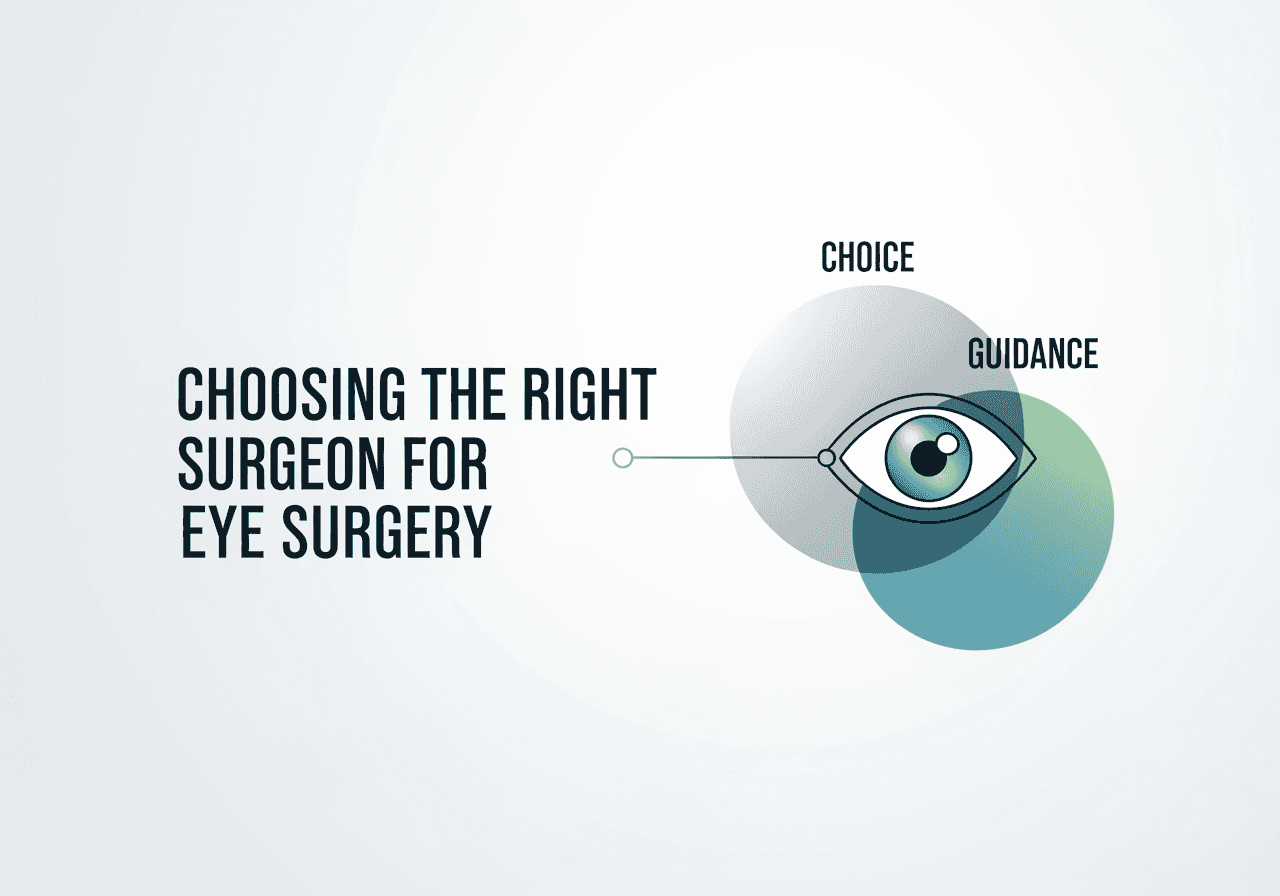
Choosing the Right Surgeon for Eye Surgery
31 Oct, 2025
 Healthtrip
Healthtrip- Why Choosing the Right Eye Surgeon Matters
- Where to Find Qualified Eye Surgeons: A Global Perspective
- Who Are the Best Candidates for Eye Surgery?
- How to Evaluate a Potential Eye Surgeon
- Success Stories and Case Studies < li>Understanding the Costs Involved
- Top Hospitals for Eye Surgery
- Conclusion: Making an Informed Decision
- Why Choosing the Right Eye Surgeon Matters
- Where to Find Qualified Eye Surgeons: A Global Perspective
- Who Are the Best Candidates for Eye Surgery?
- How to Evaluate a Potential Eye Surgeon
- Success Stories and Case Studies
- Understanding the Costs Involved
- Top Hospitals for Eye Surgery
- Saudi German Hospital Alexandria, Egypt
- Breyer, Kaymak & Klabe Augenchirurgie
- Yanhee International Hospital
- Vejthani Hospital
- Taoufik Clinic, Tunisia
- Memorial Bahçelievler Hospital
- Memorial Sisli Hospital
- NMC Specialty Hospital, Al Nahda, Dubai
- Thumbay Hospital
- Eyesite Eyecare Centres
- Real Clinic
- Saudi German Hospital Cairo, Egypt
- Helios Klinikum Erfurt
- Helios Emil von Behring
- Helios Klinikum München West
- Fortis Hospital, Noida
- Fortis Memorial Research Institute, Gurgaon
- Max Healthcare Saket
- Pantai Hospital Kuala Lumpur, Malaysia
- KPJ Ampang Puteri Specialist Hospital, Kuala Lumpur, Malaysia
- Saudi German Hospital Al-Madinah Almonawara
- Saudi German Hospital Dammam
- Saudi German Hospital Hail
- Mount Elizabeth Hospital
- Singapore General Hospital
- National Cancer Centre Singapore
- Jiménez Díaz Foundation University Hospital
- Hospital Quirónsalud Cáceres
- Quironsalud Hospital Murcia
- Bangkok Hospital
- BNH Hospital
- CGH Hospital
- Taoufik Hospitals Group, Tunisia
- LIV Hospital, Istanbul
- Hisar Intercontinental Hospital
- NPISTANBUL Brain Hospital
- NMC Royal Hospital, DIP, Dubai
- NMC Royal Hospital Sharjah
- NMC Specialty Hospital, Abu Dhabi
- London Medical
- Cleveland Clinic London
- The Royal Marsden Private Care, London
- Conclusion: Making an Informed Decision
Understanding Your Eye Surgery Options
LASIK and Refractive Surgery
LASIK, or Laser-Assisted In Situ Keratomileusis, is a popular choice for correcting nearsightedness, farsightedness, and astigmatism. It works by reshaping the cornea, the clear front part of the eye, to improve focus. Other refractive surgeries like PRK (Photorefractive Keratectomy) and SMILE (Small Incision Lenticule Extraction) offer alternative approaches with varying recovery times and suitability for different individuals. During a consultation, a surgeon will assess your eye health and refractive error to determine the best procedure for you. Factors like corneal thickness, lifestyle, and personal preferences play a role in this decision. For instance, patients at Vejthani Hospital or Yanhee International Hospital in Bangkok are given detailed assessments to determine the perfect refractive surgery plan. At Healthtrip, we help you understand the nuances of each procedure, empowering you to make an informed choice. Remember, the goal is not just to improve your vision but to enhance your overall quality of life.
Most popular procedures in India
Cataract Surgery
Cataracts, the clouding of the eye's natural lens, are a common age-related condition that can significantly impair vision. Cataract surgery involves removing the clouded lens and replacing it with an artificial lens, known as an intraocular lens (IOL). There are different types of IOLs available, each offering unique benefits, such as correcting astigmatism or enhancing near vision. The surgery is typically performed on an outpatient basis and boasts a high success rate. If you are looking for options outside your local provider, hospitals such as Memorial Sisli Hospital and LIV Hospital, both in Istanbul, offer cutting-edge cataract surgery with a variety of IOL options. Discussing your lifestyle and vision goals with your surgeon is crucial to selecting the right IOL for your needs. Healthtrip can connect you with experienced ophthalmologists who can guide you through the process, ensuring you regain clear, vibrant vision.
Other Eye Surgeries
Beyond LASIK and cataract surgery, various other eye surgeries address specific conditions such as glaucoma, retinal detachment, and strabismus (misaligned eyes). Glaucoma surgery aims to reduce intraocular pressure and prevent further damage to the optic nerve, while retinal detachment surgery focuses on reattaching the retina to the back of the eye. Strabismus surgery, often performed on children, corrects eye muscle imbalances to improve alignment and binocular vision. Each of these procedures demands specialized expertise and advanced techniques. Fortis Memorial Research Institute, Gurgaon and Max Healthcare Saket in New Delhi, offer comprehensive eye care services, including specialized surgeries performed by highly skilled surgeons. Healthtrip can help you find the right specialist for your specific condition, ensuring you receive the best possible care and outcomes.
Wellness Treatments
Give yourself the time to relax
Lowest Prices Guaranteed!

Lowest Prices Guaranteed!
Key Considerations When Choosing a Surgeon
Credentials and Experience
When it comes to your eyes, you want the best. Start by verifying the surgeon's credentials, including their medical degree, residency training in ophthalmology, and board certification. Board certification indicates that the surgeon has met rigorous standards of education, training, and competence in their specialty. Look for surgeons who have extensive experience performing the specific type of eye surgery you're considering. Ask about their success rates, complication rates, and how they handle potential issues. A surgeon's experience directly impacts the quality of care you will receive. Healthtrip can assist you in verifying the credentials and experience of surgeons, ensuring you make a well-informed decision. For example, the surgeons affiliated with the Saudi German Hospital network, including Saudi German Hospital Cairo and Saudi German Hospital Alexandria, hold impressive credentials and have years of experience treating a variety of eye conditions. Remember, your peace of mind is priceless.
Technology and Techniques
The field of ophthalmology is constantly evolving, with new technologies and techniques emerging regularly. Choose a surgeon who stays up-to-date with the latest advancements and utilizes state-of-the-art equipment. For example, Femtosecond lasers offer enhanced precision and safety in LASIK surgery, while advanced imaging systems provide detailed insights into the eye's structure. Ask your surgeon about the technology they use and how it benefits their patients. Facilities like Quironsalud Hospital Murcia and Jiménez Díaz Foundation University Hospital in Madrid, Spain are renowned for their embrace of innovative technologies in eye surgery. Healthtrip can connect you with clinics and hospitals that prioritize cutting-edge technology, ensuring you receive the most advanced and effective treatment available. Staying ahead of the curve is essential for optimal outcomes.
Patient Reviews and Testimonials
Real-world experiences from previous patients can provide valuable insights into a surgeon's skills, bedside manner, and overall patient care. Read online reviews and testimonials to get a sense of what others have experienced. Look for patterns in the feedback – are patients consistently praising the surgeon's expertise and communication skills, or are there recurring complaints about long wait times or poor follow-up care? While online reviews should be taken with a grain of salt, they can offer helpful context. Consider reaching out to former patients directly, if possible, to ask about their experiences. Healthtrip can provide you with access to patient reviews and testimonials, helping you form a comprehensive picture of the surgeon's reputation and track record. Remember, hearing from others can help ease your mind and solidify your decision.
Preparing for Your Consultation
Gathering Your Medical History
Before your consultation, take the time to gather your complete medical history, including any existing eye conditions, allergies, medications you're currently taking, and past surgeries. Be prepared to share this information with the surgeon and their staff. Understanding your medical background will help the surgeon assess your suitability for the procedure and identify any potential risks or complications. It’s also important to bring any relevant medical records, such as previous eye exam reports or imaging studies. Being thorough and transparent about your medical history is crucial for ensuring a safe and successful surgery. During initial assessments many facilities, like BNH Hospital in Bangkok, take detailed medical histories. Healthtrip can help you organize your medical information and provide you with a checklist of items to bring to your consultation, making the process smoother and more efficient.
Formulating Questions to Ask
Your consultation is an opportunity to gather information and address any concerns you may have. Prepare a list of questions to ask the surgeon, covering topics such as their experience with the procedure, the risks and benefits, the expected recovery process, and the costs involved. Don't be afraid to ask for clarification if you don't understand something. A good surgeon will take the time to answer your questions thoroughly and patiently, ensuring you feel comfortable and confident. Some important questions to consider include: "What is your success rate with this procedure?" "What are the potential risks and complications?" and "What can I expect during the recovery process?". Healthtrip provides resources and sample questions to help you prepare for your consultation, empowering you to make the most of your time with the surgeon.
Understanding the Costs Involved
Eye surgery can be a significant investment, so it's essential to understand the costs involved upfront. Ask the surgeon's office for a detailed breakdown of the fees, including the surgeon's fee, facility fee, anesthesia fee, and any additional costs for pre-operative testing or post-operative care. Inquire about payment options and whether your insurance plan covers any portion of the surgery. Be aware that some procedures, such as LASIK, are often considered elective and may not be covered by insurance. Facilities such as Taoufik Clinic, Tunisia and Saudi German Hospital Dammam, offer comprehensive cost breakdowns to help patients plan. Healthtrip can help you navigate the financial aspects of eye surgery, providing resources and information on financing options and insurance coverage. Understanding the costs upfront will help you avoid unexpected surprises and make informed decisions about your budget.
Making Your Decision and Moving Forward
Trusting Your Gut
After you've done your research, gathered information, and met with potential surgeons, it's time to make a decision. Ultimately, the best surgeon for you is someone you feel comfortable and confident with. Trust your gut feeling and choose a surgeon who listens to your concerns, communicates effectively, and instills trust. Don't be afraid to seek a second opinion if you're feeling unsure. The choice is entirely yours, and you deserve to feel 100% confident in your decision. Remember, this is your vision we're talking about! Healthtrip is here to support you every step of the way, providing resources and guidance to help you make the right choice for your needs. We understand that choosing a surgeon is a personal decision, and we're committed to empowering you with the information and support you need to feel confident and secure.
Scheduling Your Surgery
Once you've chosen your surgeon, the next step is to schedule your surgery. The surgeon's office will provide you with pre-operative instructions, including dietary restrictions, medication guidelines, and what to expect on the day of surgery. Follow these instructions carefully to ensure a smooth and successful procedure. Be sure to ask any remaining questions you may have and address any concerns before your surgery date. It's also a good idea to arrange for transportation to and from the surgery center, as you may not be able to drive yourself home. Facilities such as Mount Elizabeth Hospital in Singapore and Bangkok Hospital are known for their detailed pre-operative preparations. Healthtrip can assist you with travel arrangements, accommodation, and other logistical details, making your surgery experience as stress-free as possible.
Following Post-Operative Care Instructions
Post-operative care is crucial for achieving optimal results and preventing complications. Follow your surgeon's instructions carefully, including taking prescribed medications, using eye drops as directed, and attending follow-up appointments. Avoid rubbing your eyes, strenuous activities, and exposure to irritants during the recovery period. Be patient and allow your eyes time to heal properly. Contact your surgeon immediately if you experience any unusual symptoms, such as pain, redness, or decreased vision. Facilities like Cleveland Clinic London and Helios Klinikum München West provide detailed post-operative care instructions and support. Healthtrip can help you stay organized and on track with your post-operative care, providing reminders for appointments and medications and connecting you with resources for support and guidance. Remember, proper post-operative care is essential for achieving the best possible outcome.
Why Choosing the Right Eye Surgeon Matters
Imagine your vision as a vibrant, high-definition movie screen, allowing you to experience the world in all its colorful glory. Now, picture that screen becoming blurry, distorted, or even fading to black. This is the reality many face with deteriorating eyesight, making everyday tasks challenging and impacting their overall quality of life. Eye surgery can often be a life-changing solution, restoring clarity and independence. However, the success of any eye procedure hinges dramatically on one critical factor: the skill and expertise of the surgeon. Choosing the right eye surgeon is not merely a matter of preference; it's an investment in your visual future, a decision that can profoundly influence your well-being. With Healthtrip, you're not just finding a surgeon; you're securing a brighter, clearer tomorrow. Think of it like this: you wouldn't trust just anyone to fix your prized sports car, would you? Your eyes, arguably even more valuable, deserve the same level of meticulous care and attention. A qualified and experienced surgeon possesses the in-depth knowledge, technical precision, and artistic eye to navigate the intricate landscape of the eye, ensuring optimal outcomes and minimizing potential risks. They can accurately diagnose your specific condition, recommend the most appropriate treatment plan, and execute the surgery with unparalleled skill, safeguarding your precious sight. After all, Healthtrip is here to guide you along every step of the way.
Precision and Expertise: The Cornerstones of Successful Eye Surgery
The human eye is a delicate and complex organ, requiring a surgeon with exceptional precision to operate on it successfully. A highly skilled eye surgeon has undergone extensive training and possesses a thorough understanding of the eye's anatomy, physiology, and potential complications. They are adept at utilizing advanced surgical techniques and technologies to achieve the best possible visual results. Choosing a surgeon with proven expertise significantly reduces the risk of errors, complications, and the need for revision surgeries. Moreover, an experienced surgeon can tailor the surgical approach to your unique needs, considering factors like your age, medical history, and lifestyle. They will take the time to thoroughly explain the procedure, answer your questions, and address any concerns you may have, fostering a sense of trust and confidence. With Healthtrip, finding a surgeon who combines technical prowess with genuine patient care becomes a seamless experience. Remember, your eyes are more than just organs; they are windows to the world, and choosing the right surgeon is like hiring the best window cleaner to ensure a crystal-clear view.
Minimizing Risks and Maximizing Outcomes
Every surgical procedure carries some inherent risks but choosing the right eye surgeon can significantly minimize these risks and maximize the chances of a successful outcome. A skilled surgeon is well-versed in managing potential complications, such as infections, bleeding, and inflammation. They will take all necessary precautions to prevent these issues from arising and have the expertise to address them promptly and effectively if they do occur. Furthermore, the right surgeon will provide comprehensive pre-operative and post-operative care, ensuring that you are well-prepared for the surgery and that you receive the necessary support and guidance throughout your recovery. This includes detailed instructions on medication, eye drops, and lifestyle modifications to promote healing and prevent complications. Finding a qualified professional is easy with Healthtrip. Think of it as having a seasoned navigator guiding you through potentially turbulent waters, ensuring a smooth and safe journey to improved vision. By entrusting your eyes to a competent and caring surgeon, you can rest assured that you are in the best possible hands, allowing you to embark on your journey to better eyesight with confidence and peace of mind. For example, you might find yourself drawn to facilities like Saudi German Hospital Alexandria, Egypt, known for its commitment to patient care and advanced technologies.
Where to Find Qualified Eye Surgeons: A Global Perspective
The quest for a qualified eye surgeon can feel like navigating a vast and ever-changing landscape. Fortunately, with Healthtrip, this journey becomes significantly easier. Access to exceptional eye care is no longer limited by geographical boundaries. Whether you're seeking a renowned specialist in Germany, a cutting-edge clinic in Thailand, or a trusted practitioner in your own country, the world of eye surgery is now more accessible than ever. Platforms like Healthtrip serve as invaluable resources, connecting patients with top-tier surgeons across the globe. We streamline the search process, providing detailed profiles, verified credentials, and patient reviews, empowering you to make an informed decision. It's like having a personal guide who has already explored the terrain, highlighting the safest and most promising paths to follow. From the bustling metropolis of Bangkok to the serene landscapes of Switzerland, exceptional eye surgeons can be found in virtually every corner of the world. The key is leveraging the resources available to you, conducting thorough research, and prioritizing factors like experience, expertise, and patient satisfaction. And don't forget to consider hospitals like Yanhee International Hospital in Thailand, or Breyer, Kaymak & Klabe Augenchirurgie in Germany, both known for their ophthalmic expertise.
Utilizing Online Resources and Databases
In today's digital age, the internet has become an indispensable tool for finding qualified eye surgeons. Numerous online resources and databases provide comprehensive information on surgeons, including their credentials, experience, areas of specialization, and patient reviews. Healthtrip consolidates much of this data, offering a user-friendly platform to compare different surgeons and clinics. Websites like the American Academy of Ophthalmology (AAO) and the Royal College of Ophthalmologists (RCO) also maintain directories of certified ophthalmologists, ensuring that you are choosing a qualified and reputable professional. When utilizing online resources, it's essential to verify the information you find and to be wary of unqualified self-advertising. Look for surgeons who are board-certified, have extensive experience in the specific type of surgery you need, and have consistently positive patient reviews. Don't hesitate to contact the surgeon's office directly to ask questions and to inquire about their qualifications and experience. With Healthtrip, you get verified professionals, taking the guesswork out and adding transparency to your choices. Think of it as having a detective on your side, investigating the background and qualifications of each surgeon to ensure they meet the highest standards.
Seeking Recommendations and Referrals
Word-of-mouth recommendations and referrals from trusted sources can be invaluable in your search for a qualified eye surgeon. Talk to your primary care physician, optometrist, or other healthcare professionals, asking them for recommendations based on their own experiences and knowledge. Friends, family members, and colleagues who have undergone eye surgery can also provide valuable insights and personal recommendations. When seeking referrals, be sure to ask about the surgeon's communication style, patient care approach, and the overall experience. Consider whether the surgeon took the time to thoroughly explain the procedure, answered all questions patiently, and provided adequate support throughout the recovery process. A positive recommendation from a trusted source can provide significant peace of mind and can help you narrow down your options. Healthtrip can also connect you with patient testimonials. Think of it as gathering a team of advisors who have already gone through the journey, sharing their experiences and guiding you towards the best possible option. For instance, many seeking care in the Middle East turn to centers like NMC Specialty Hospital, Al Nahda, Dubai, or Saudi German Hospital Cairo, Egypt, for their well-regarded ophthalmology departments.
Who Are the Best Candidates for Eye Surgery?
Eye surgery isn't a one-size-fits-all solution; it's a carefully considered decision based on individual circumstances. Determining whether you're a suitable candidate involves a thorough evaluation of your eye health, overall health, and specific vision correction needs. Generally, individuals with common vision problems like nearsightedness (myopia), farsightedness (hyperopia), astigmatism, and cataracts are often good candidates for various types of eye surgery. However, certain factors can influence your eligibility, such as age, corneal thickness, pre-existing eye conditions, and overall health conditions. Healthtrip’s network of professionals can help you assess these considerations and make informed decisions. It's like getting a personalized roadmap that guides you towards the most appropriate path for your eye health. Remember, good candidates are those who are motivated to improve their vision, have realistic expectations about the outcomes of surgery, and are committed to following the surgeon's instructions before and after the procedure.
Assessing Visual Acuity and Stability
A crucial factor in determining candidacy for eye surgery is the stability of your vision. If your vision is still changing significantly, it may be premature to consider corrective surgery. Most surgeons recommend that your prescription be stable for at least one year before undergoing procedures like LASIK or PRK. This ensures that the surgical correction will be more accurate and long-lasting. Furthermore, your current visual acuity, or sharpness of vision, will be assessed to determine the extent of correction needed. Individuals with moderate to high levels of nearsightedness, farsightedness, or astigmatism may benefit more from surgery than those with mild refractive errors. Your surgeon will perform a comprehensive eye exam to measure your visual acuity and assess the stability of your vision. Healthtrip helps connect you for these evaluations to qualified specialists. Think of it as making sure the foundation is solid before building a house; stable vision provides a stable base for surgical correction, increasing the likelihood of a successful outcome and customer satisfaction. Hospitals like Fortis Hospital, Noida, provide comprehensive vision assessments which are critical for determining eligibility for eye surgery.
Considering Age and Overall Health
Age and overall health are also important considerations when determining candidacy for eye surgery. While there is no strict age limit for many procedures, younger individuals may be more likely to experience changes in their vision over time, potentially requiring additional correction in the future. Older individuals may have pre-existing eye conditions, such as cataracts or glaucoma, which may need to be addressed before or in conjunction with refractive surgery. Certain medical conditions, such as diabetes, autoimmune diseases, and uncontrolled high blood pressure, can also increase the risk of complications during and after surgery. It's essential to discuss your medical history and any medications you are taking with your surgeon to determine if you are a suitable candidate. Healthtrip allows you to connect with surgeons who understand these complexities, ensuring that all your health considerations are taken into account. Imagine your body as a finely tuned engine; any underlying issues need to be addressed before making significant modifications to the system.
Also Read:
How to Evaluate a Potential Eye Surgeon
Choosing the right eye surgeon is a decision that requires careful consideration and due diligence. After all, your vision is invaluable, and entrusting it to a skilled and experienced professional is paramount. Don't rush into this process. Take your time to research and evaluate potential surgeons, ensuring that you feel confident and comfortable with your final choice. Start by verifying the surgeon's credentials and certifications. Check if they are board-certified in ophthalmology and have completed a fellowship in a specialized area of eye surgery relevant to your specific needs. Board certification signifies that the surgeon has met rigorous standards of education, training, and expertise. Furthermore, explore the surgeon's experience. How many years have they been practicing? How many procedures have they performed similar to the one you need? A surgeon with extensive experience is more likely to have encountered and successfully managed various complications, increasing the likelihood of a favorable outcome for you. Look for testimonials that highlight not only technical expertise but also compassionate patient care. A surgeon who takes the time to listen to your concerns, answer your questions thoroughly, and explain the procedure in a clear and understandable manner is someone you can trust. Confirm that the surgeon has a clean disciplinary record and isn't subject to any malpractice claims.
Assessing the Surgeon's Expertise and Experience
Delving deeper into a surgeon's expertise and experience involves a multi-faceted approach. Beyond simply checking years in practice, explore the types of procedures they specialize in. Do they focus on a broad range of eye surgeries, or do they have a niche expertise that aligns with your specific condition? A surgeon who specializes in a particular area is likely to have a more refined skill set and a deeper understanding of the nuances of that specific procedure. Don't hesitate to ask detailed questions about their experience with your specific condition. What is their success rate? What are the potential risks and complications? How do they manage these complications if they arise? A confident and experienced surgeon will be able to answer these questions thoroughly and transparently. It's also beneficial to inquire about the surgeon's involvement in research or teaching. Surgeons who are actively involved in research are more likely to be up-to-date with the latest advancements in the field. Those who teach are often highly regarded by their peers and have a strong understanding of the fundamentals of eye surgery. Consider seeking a second opinion from another ophthalmologist. This can provide you with additional perspectives and help you make a more informed decision. Finally, trust your gut instinct. Choose a surgeon with whom you feel comfortable and confident. Someone who makes you feel at ease and inspires trust is more likely to provide you with a positive surgical experience.
Also Read:
Success Stories and Case Studies
Hearing about successful outcomes and learning from real-life experiences can be incredibly reassuring when considering eye surgery. Success stories and case studies provide tangible evidence of the potential benefits and can help alleviate anxieties. Consider the story of a young artist who struggled with nearsightedness for years. Simple tasks like painting and sketching became increasingly challenging, hindering her passion and career. After undergoing LASIK surgery, her vision was dramatically improved. She could finally see fine details with clarity, allowing her to create art with renewed enthusiasm and precision. This is just one example of how eye surgery can transform lives. Case studies, often presented at medical conferences or published in journals, offer more in-depth analyses of specific surgical cases. These studies detail the patient's condition, the surgical approach used, the outcome achieved, and any complications encountered. By reviewing case studies, you can gain a better understanding of the potential risks and benefits of different surgical techniques and how surgeons manage challenging situations. Keep in mind that every patient is unique, and the outcome of eye surgery can vary depending on individual factors such as age, overall health, and the specific condition being treated. While success stories and case studies can offer inspiration and information, you should always discuss your specific situation with your eye surgeon to determine if surgery is right for you and what results you can realistically expect.
Understanding the Spectrum of Outcomes in Eye Surgery
While success stories are inspiring, it's equally important to understand the full spectrum of potential outcomes in eye surgery. Not every procedure is a resounding success, and complications can occur. It's essential to have a realistic expectation, understanding that results can vary from person to person. Some patients may achieve perfect vision after surgery, while others may require glasses or contact lenses for certain activities. Some may experience temporary side effects such as dry eyes or halos around lights. In rare cases, more serious complications can occur, such as infection, bleeding, or vision loss. A responsible and ethical surgeon will fully inform you of all potential risks and complications before you make a decision about surgery. They will also discuss how they manage these complications if they arise. It's important to ask questions and express any concerns you have. Take the time to weigh the potential benefits of surgery against the potential risks. Consider your individual needs and lifestyle. Are you willing to accept the possibility of needing glasses or contact lenses after surgery? Are you comfortable with the potential side effects? Ultimately, the decision to undergo eye surgery is a personal one. It's a decision that should be made after careful consideration and with a clear understanding of the potential risks and benefits.
Also Read:
Understanding the Costs Involved
The cost of eye surgery can be a significant factor in your decision-making process. It's important to have a clear understanding of all the expenses involved, including the surgeon's fees, facility fees, anesthesia fees, and the cost of pre- and post-operative care. The total cost of eye surgery can vary widely depending on the type of procedure, the surgeon's experience, the location of the surgery, and your insurance coverage. LASIK surgery, for example, can range from a few thousand dollars per eye to significantly more, depending on the technology used and the surgeon's expertise. Cataract surgery costs can vary depending on the type of lens implanted and whether or not you choose to have any additional procedures performed at the same time. Before scheduling surgery, ask for a detailed breakdown of all costs involved. This will allow you to compare prices from different surgeons and facilities and make an informed decision. It's also important to check with your insurance company to see what portion of the costs they will cover. Some insurance plans may cover certain types of eye surgery, such as cataract surgery, while others may not cover elective procedures like LASIK. Even if your insurance plan covers a portion of the costs, you may still be responsible for a deductible, co-payment, or co-insurance. Be sure to understand your insurance coverage before scheduling surgery.
Navigating Insurance and Financing Options
Navigating the complexities of insurance coverage and exploring financing options can feel overwhelming, but it's a crucial step in making eye surgery accessible. Understanding your insurance policy is the first step. Contact your insurance provider directly and inquire about coverage for the specific procedure you are considering. Ask about deductibles, co-payments, co-insurance, and any exclusions that may apply. If your insurance doesn't cover the full cost of surgery, or if you don't have insurance, explore financing options. Many surgeons and facilities offer payment plans that allow you to spread the cost of surgery over time. These plans may have interest rates, so be sure to compare different options and choose the one that best fits your budget. Some healthcare financing companies specialize in providing loans for medical procedures. These loans may have competitive interest rates and flexible repayment terms. If you have a health savings account (HSA) or a flexible spending account (FSA), you can use these funds to pay for eligible medical expenses, including eye surgery. HSAs and FSAs offer tax advantages, making them a cost-effective way to pay for healthcare. Don't be afraid to discuss your financial concerns with your surgeon or their staff. They may be able to offer suggestions or point you to resources that can help you afford the surgery you need. Remember, investing in your vision is an investment in your overall well-being and quality of life.
Also Read:
Top Hospitals for Eye Surgery
Choosing the right hospital for your eye surgery is as important as selecting the right surgeon. The hospital's facilities, technology, and overall reputation can significantly impact the quality of your care and the outcome of your procedure. Look for hospitals with state-of-the-art equipment, experienced medical staff, and a strong track record of successful eye surgeries. Many hospitals specialize in ophthalmology and have dedicated eye centers with advanced diagnostic and surgical capabilities. These centers often offer a comprehensive range of services, from routine eye exams to complex surgical procedures. Consider hospitals that are accredited by reputable organizations. Accreditation signifies that the hospital has met rigorous standards for quality and safety. Research the hospital's reputation online. Read reviews from previous patients and check for any disciplinary actions or malpractice claims. Visit the hospital's website to learn more about their services, facilities, and staff. If possible, schedule a tour of the eye center to see the facilities firsthand and meet some of the staff.
Featured Hospitals with Exceptional Ophthalmology Departments
When it comes to eye surgery, selecting a reputable hospital with a dedicated ophthalmology department is crucial. Here are a few hospitals known for their exceptional eye care services, several of which are partnered with Healthtrip to facilitate your medical journey: Saudi German Hospital Alexandria, Egypt, boasts modern facilities and experienced ophthalmologists, providing comprehensive eye care services. Yanhee International Hospital in Bangkok, Thailand, is a popular destination for medical tourists, offering a wide range of eye surgeries with advanced technology. Vejthani Hospital, also in Bangkok, is another well-regarded hospital with a dedicated eye center and a team of skilled surgeons. Memorial Bahçelievler Hospital and Memorial Sisli Hospital, both in Istanbul, Turkey, are known for their high standards of care and experienced ophthalmology teams. In the United Arab Emirates, NMC Specialty Hospital, Al Nahda, Dubai provides comprehensive eye care services, including advanced surgical procedures. Thumbay Hospital, also in Dubai, offers a range of ophthalmology services with experienced specialists. Saudi German Hospital Cairo, Egypt offers a wide array of ophthalmological services to cater to various needs. Germany has notable institutions like Helios Klinikum Erfurt and Helios Emil von Behring, known for their advanced medical technology and highly trained specialists. Fortis Hospital, Noida and Fortis Memorial Research Institute, Gurgaon in India, are renowned for their advanced medical treatments and experienced surgeons, making them reliable choices for eye surgeries. It's recommended to research these and other hospitals thoroughly, considering factors such as expertise in your specific eye condition, patient reviews, and accessibility through platforms like Healthtrip, which can assist in coordinating your treatment and travel arrangements.
Conclusion: Making an Informed Decision
The journey to better vision through eye surgery is a significant one, and making an informed decision is paramount. As we've explored, choosing the right eye surgeon involves meticulous research, careful evaluation, and a healthy dose of self-reflection. From understanding the importance of board certification and surgical experience to weighing the potential benefits against the risks, every step is crucial in ensuring a positive outcome. Don't rush the process. Take the time to gather information, ask questions, and trust your instincts. Consider seeking second opinions, exploring financing options, and researching reputable hospitals. Remember, your vision is precious, and entrusting it to a skilled and compassionate professional is an investment in your overall well-being. By empowering yourself with knowledge and taking control of your healthcare journey, you can confidently embark on the path to clearer, brighter vision. Healthtrip is here to support you every step of the way, connecting you with qualified surgeons, providing access to valuable resources, and helping you navigate the complexities of medical travel. Your vision is our priority, and we are committed to helping you achieve the best possible outcome.
Related Blogs

Long-Term Follow-Up After Eye Surgery
Detailed insights into eye surgery – doctors, hospitals, technology, recovery,

Healthtrip’s Transparency in Eye Surgery Pricing and Packages
Detailed insights into eye surgery – doctors, hospitals, technology, recovery,

Frequently Asked Questions About Eye Surgery
Detailed insights into eye surgery – doctors, hospitals, technology, recovery,

Advanced Robotic Technology Used in Eye Surgery
Detailed insights into eye surgery – doctors, hospitals, technology, recovery,

How Healthtrip Supports Foreign Patients for Eye Surgery in India
Detailed insights into eye surgery – doctors, hospitals, technology, recovery,

Top Medical Packages for Eye Surgery Offered by Healthtrip
Detailed insights into eye surgery – doctors, hospitals, technology, recovery,










